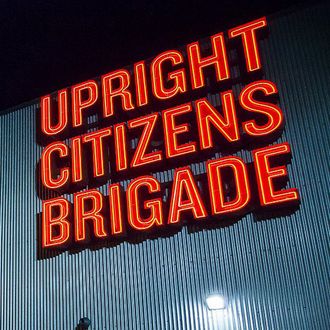
When comedians Beth Stelling and Courtney Pauroso came together to share their stories of sexual and physical abuse from another member of the L.A. comedy scene, they were part of a growing sisterhood: As BuzzFeed’s Katie J.M. Baker reports, female comedians all over the scene have increasingly turned to private Facebook groups as a way to tell stories of — and sometimes expose — male abusers in their midst.
Like much of the entertainment business, the comedy world in Los Angeles is dominated by men, and many women say the usual pressure for women to stay quiet about mistreatment from male teachers and collaborators is intensified by the improv philosophy “yes, and” — the need to be game, up for anything. And the comedy industry’s tremendous growth over the last half-decade, paired with the blurring of the lines between fan, participant, and instructor, means that L.A.’s comedy theaters have generally been ill equipped to properly adjudicate accusations of assault in their communities. (Though, Baker reports, both iO West and UCB have recently hired administrators to implement anti-harassment policies.) Instead, female comedians have turned to a loose network of Facebook groups where women come together and name names.
Baker’s examples include five women who say they discovered through a Facebook group that they had all been raped by the same man. They, in turn, came together to get him banned from comedy theaters, and some took his name to the police. Then there’s the case of “A.M.,” a man with a bad reputation of sending sexually explicit texts to female acquaintances in the scene; armed with screenshots from the group, the women got him banned from both UCB and iO. And then there’s “the Actor,” a powerful instructor who would not stop aggressively hitting on women in the scene, many of whom were in the awkward position of needing his approval to rise higher in the comedy ranks. Faced with an uncomfortable decision, many of them simply avoided him, even if it harmed their careers. After years of warnings and even a failed intervention, the women reported his behavior to every theater he was associated with; he was blacklisted from the community and eventually moved back to the Midwest.
But while these private Facebook groups operate primarily as a way for victims to come together and share their stories, once exposed to the outside world, they have a tendency to blow up uncontrollably, with outsiders intensifying the conversation to a point that Shireen Oberman, the licensed therapist UCB hired as director of student affairs, warned of a “mob mentality.” In the case of “the Actor,” many participants in the online discussions characterized him as a “rapist,” and women who tried to argue against the tide often found themselves lectured (sometimes by men) that disagreement was ruining the “safe space.” But despite this, women in the community see the Facebook groups as the best imperfect option of combating the rampant abuse within the community. As comedian Gina Ippolito told BuzzFeed, “Guys in this community were like, ‘Oh, you’re going to use this group to start a witch hunt.’ It’s only a witch hunt if the witches don’t exist.”


